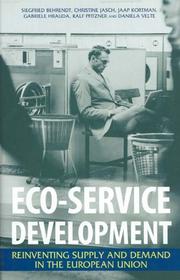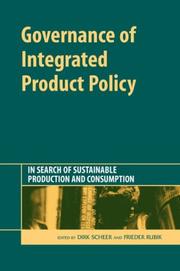| Listing 1 - 3 of 3 |
Sort by
|

ISBN: 079146511X 0791482936 1423748670 9781423748670 9780791465110 9780791482933 Year: 2005 Publisher: Albany : State University of New York Press,
Abstract | Keywords | Export | Availability | Bookmark
 Loading...
Loading...Choose an application
- Reference Manager
- EndNote
- RefWorks (Direct export to RefWorks)
Significant changes in how the world approaches global environmental problems have occurred since the late 1970s. Countries have become increasingly aware of the "borderless" nature of environmental issues, i.e., that production and consumption in one country can spill over to affect another country's environment. Protecting Our Environment considers the successes that have been achieved in the European Union (EU), as well as issues the Union still faces regarding the protection of the environment in the future. Authors Janet R. Hunter and Zachary A. Smith identify the factors that have allowed the EU to form a successful environmental regime, including the development of the environmental management approach and the principles upon which it is based. They examine in detail the challenges that have been encountered in the implementation of environmental programs, and the solutions that have been developed to address those challenges. Also considered is how economic development and environmental protection have been reconciled within the EU. By analyzing the successful example of the EU, Protecting Our Environment provides a model for a contemporary approach to global environmental problems.

ISBN: 1874719446 1909493295 1351282166 1351282158 9781909493292 9781874719441 9781351282161 135128214X Year: 2003 Publisher: Sheffield Greenleaf Pub.
Abstract | Keywords | Export | Availability | Bookmark
 Loading...
Loading...Choose an application
- Reference Manager
- EndNote
- RefWorks (Direct export to RefWorks)
"Sustainable development will not be possible without fundamental improvements in resource productivity and energy efficiency, the adaptation of material flows into natural cycles as well as a radical change in production and consumption patterns. In essence, what is required is not only an ecological approach to product design but also new marketing and consumption patterns for products that can satisfy our needs in a more environmentally sound way. In recent years there has been growing interest in the possibilities of eco-services to achieve some of these aims. Ecologically oriented leasing, renting, pooling and sharing, where the emphasis is placed on the sale of a product's use rather than on the product itself, offer great possibilities for innovation and environmental impact reduction. At the same time, there are opportunities to create new commercial enterprises, produce added value to production and distribution functions, and therefore create jobs. Up until now, however, there has been little research about the state of the art in eco-services, how new services can be developed, what the attitudes of consumers are to services rather than products and what the consequences of such a structural adjustment would be for firms. Eco-service Development addresses this lack of research, first by providing a comprehensive inventory and analysis of current eco-services in four European countries: Germany, Austria, the Netherlands and Spain. It then systematically explores the options open to market participants, the potential for environmental impact reduction, potential barriers to eco-services (such as consumer and producer resistance) and, finally, with what political and legal instruments ecologically oriented services can best be promoted. The book analyzes eight consumer sectors - washing, cleaning, cooking, entertainment, gardening, do-it-yourself, mobility and leisure time - from the point of view of both supply and demand and highlights the optimization potential and development perspectives for commercial new use eco-service concepts. This book is the most comprehensive analysis yet published of how eco-services are being implemented and how they could best be encouraged and contains valuable lessons for policy-makers, interested businesses and all those in the academic community searching for ways to dematerialize the economy."--Provided by publisher.

ISBN: 1874719322 9781874719328 1909493589 1351282603 135128259X 9781909493582 9781351282604 9781351282598 9781351282574 1351282573 1351282581 Year: 2006 Publisher: Sheffield Greenleaf Pub.
Abstract | Keywords | Export | Availability | Bookmark
 Loading...
Loading...Choose an application
- Reference Manager
- EndNote
- RefWorks (Direct export to RefWorks)
"European policy patterns are in a state of transformation. New governance models are shifting power away from states and toward the involvement of all stakeholders and the idea of shared responsibility. It's a move from command and control to push and pull.What's in this new approach for the environment? This book provides a detailed analysis of the example of integrated product policy (IPP) which aims to improve the environmental performance of products and services through their life-cycle. All products cause environmental degradation in some way, whether from their manufacturing, use or disposal. The life-cycle of a product is often long and complicated. It covers all the areas from the extraction of natural resources, through their design, manufacture, assembly, marketing, distribution, sale and use to their eventual disposal as waste. At the same time it also involves many different actors such as designers, manufacturers, marketers, retailers and consumers. IPP attempts to systematically stimulate each phase of this complicated chain to improve its environmental performance. With the involvement of so many different products and actors there cannot be one simple policy measure for everything. Instead, IPP employs a whole variety of tools - both voluntary and mandatory - which are used to achieve identified objectives. These include economic instruments, the phase-out of dangerous materials, voluntary agreements, eco-labelling and product design guidelines.IPP is still in relative infancy and can be seen as an ongoing process hugely dependent on effective governance measures to ensure its continued success. This book presents a plethora of perspectives from policy-makers, researchers and consultancies, representatives from business, environmental and consumer associations on how to effectively conceptualise, institutionalise and implement IPP.The book is divided into four parts. First, the approach to the governance of IPP is examined in relation to other approaches to sustainable production and consumption. Second, the widely differing approaches to environmental product policy in practice at national, supranational and global level are analysed. Third, the book explores the challenge of designing a coherent policy mix to support the integration of sustainable consumption and production patterns by sector and theme. Finally, the book concentrates on the key issue of how to involve stakeholders in IPP in order to encourage continuous innovations for sustainability throughout the value chain.Governance of Integrated Product Policy? aims to fill a clear gap in work to date on sustainable production and consumption by providing researchers and practitioners from politics, business and civil society new insights into modern environmental governance in practice."--Provided by publisher.
Sustainable development --- Production management --- Consumption (Economics) --- Développement durable --- Production --- Consommation (Economie politique) --- Law and legislation --- Environmental aspects --- Droit --- Gestion --- Aspect de l'environnement --- Environmental policy -- European Union countries. --- Sustainable development -- European Union countries. --- Commerce --- Business & Economics --- Marketing & Sales --- Environmental policy --- Industrial ecology --- Développement durable --- Materials management
| Listing 1 - 3 of 3 |
Sort by
|

 Search
Search Feedback
Feedback About UniCat
About UniCat  Help
Help News
News